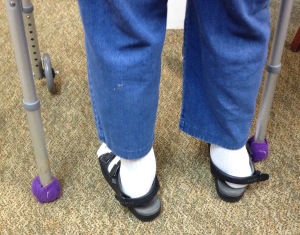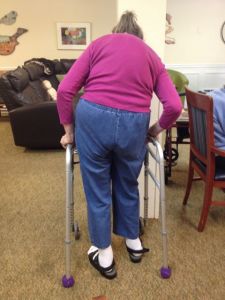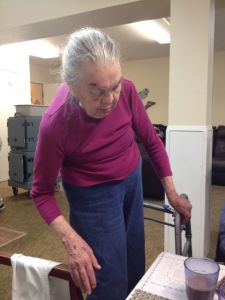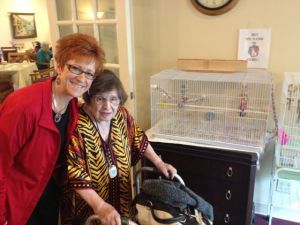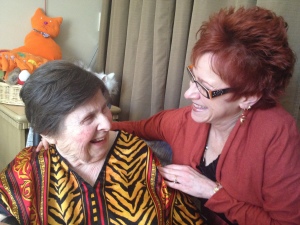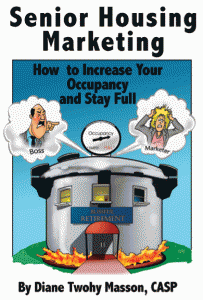Marketing 2 Seniors | The Blog
with Author: Diane Masson
“Your Senior Housing Options,” Channel 6 Interview with Diane Masson
“Your Senior Housing Options,” has a simplistic title, but what’s inside this new book can save you months of research time. Hear Diane Masson’s interview of how her mother and in-law’s faced the pivotal decision to plan ahead or wait until a crisis. Learn the pitfalls from transitioning from your home to senior housing. Understand what questions to ask, insider tips and dirty secrets revealed. The decision to stay home requires caregivers. Prevent elder abuse by determining if a home care agency is reputable, before they move into your home. You are just not looking for today’s needs, but for your future care. Discover key differences between rental facilities vs Continuing Care Retirement Communities. Do you have enough financial resources if you need to be in a higher level of care for an extended period of time? Please enjoy my new interview. For more info: Www.Tips2Seniors.com
Diane Masson is a senior housing expert, the author of two books and regional marketing director for two debt-free Continuing Care Retirement Communities in Southern CA: Freedom Village in Lake Forest and The Village in Hemet.
Un-engaged at Work? Only 30.5% are Engaged. 10 RECHARGING TIPS!
Is there a crack in your armor? Are you living on empty and have nothing left to give your family or job? Maybe you are a full-or part-time caregiver for an aging parent or a senior with dementia? Perhaps you are in a senior living sales slump?
You can’t help anyone else or be productive at work unless you take care of yourself first. Look for joy in the moments. You may be going through a dire time. Maybe your parent or one of your senior patients is dying. Perhaps your daughter or son has some kind of health or school trauma. Possibly you just learned that someone scheduled to move into your retirement community has changed his or her mind. It may have been the one you needed to hit your sales goal this month. Sigh…they are going to stay home and wait for a crisis. You start asking why over and over.
Don’t become jaded and harden yourself with a giant wall to protect your emotions. It’s mentally checking out and called un-engagement. Your family, senior prospective residents and coworkers can feel your wall.
If you work in senior living sales, we can’t help every senior. Only the ones who choose to plan ahead. Do you feel overwhelmed with what’s happening in your personal life? Is your lack of sales getting you down? Well it’s time to go find your rainbow. Are you wondering how to get started? Feed your mind with positive thoughts. Schedule time to heal yourself!
10 Recharging Tips:
- Go to a live concert, stand in your shower or drive down the road singing at the top of your lungs.
- Sit by the ocean and wiggle your toes in the sand.
- Fly down the road with the wind in your face on a bike or motorcycle.
- Hold a baby or play with small children.
- Take a Saturday to read a book.
- Hang out with your friends.
- Spend time in nature – amongst the trees, watching the river go by or gazing at a lake.
- Soak in a bubble bath surrounded by candles.
- Go to a sports game in person. Cheer on your favorite team.
- Build a fire and make s’mores!
Recharge today, so you can change your world one senior or family member at a time.
Let your family and job see your heart when you speak. They will be moved and feel your sincerity. Seniors can tell if you want what’s best for them. Suddenly seniors who were “not ready yet” become ready to move into your retirement community. Conviction in your voice can move a mountain.
Shake off the negative. Don’t focus on the junk. I created a spiritual foundation of faith that can sustain me when I have a tough day. You can too. We all have moments of weakness. Believe in your ability to change a senior’s or family member’s life today.
In every encounter with family or at work, we either give life or drain it.
Do you give life to those around you at work and at home? Are you so worn out from working that you have nothing left to give your family? It’s your choice to be a giver or taker to those around you. Have you taken time to recharge yourself recently?
Exciting news! Diane’s CCRC teams are breaking records and hitting aggressive occupancy goals this quarter. They all participate in a weekly book review led by Diane. The book review helps the teams stay on track, improve sales skills and build team camaraderie. They just completed learning the 12 keys in Senior Housing Marketing: How to Increase Your Occupancy and Stay Full for senior living professionals. It was written by Diane Twohy Masson.
Credit to Gallop: Only 30.5% of employees are engaged at work.
Everyone of us knows at least one senior that needs to move now. Here is a resource to help you or them make an informed decision. Diane Twohy Masson’s new guide book for seniors, “Your Senior Housing Options,” is available on Amazon.com with a 5-star rating. It reveals a proactive approach to navigating the complex maze of senior housing options. It will help you understand the costs and consequences of planning ahead or waiting too long. Learn firsthand tips from someone who is currently advocating for two aging parents.
Among the thousands of seniors she and her teams have assisted in finding the right senior living community, the most difficult case has been helping her own parent. Masson spent two years exploring senior housing options with her mother before finding the ideal Continuing Care Retirement Community for her. After eight years in this independent living setting, she helped her mother transition into an assisted living community. Seven years later, even as a senior housing expert, Masson struggled with the decision to move her mother into a skilled nursing community.
More related articles by Diane can be found at Tips2Seniors.com or like Tips 2 Seniors on Facebook.
What do you do? What’s your 30-second commercial?
We’ve all been at a party when a new acquaintance asks, “What do you do?” What is your response? Is it engaging and interesting? Or does your heart drop, because you have to talk about work and you end up sharing a boring list of your duties or mumble your exact job title?
Every one of us can improve our 30-second commercial and make it captivating to the listener.
Here are a couple of tips of what not to do:
- No laundry list of duties
- Don’t just give your job title and company name
At Seattle’s Pike Place Market, a company that sold fish seven days a week decided to make it interesting. They were determined to have fun and engage the customers. So the motivated employees started throwing the fish that customers were purchasing. Now they are a huge tourist attraction and sell lots of fish.
If you work for a senior living company and simply state you work at an assisted living or skilled nursing community, it sounds boring. Saying, “We improve the quality of seniors lives everyday,” – makes your acquaintance ask a secondary questions of – how? Everyone typically knows an aging parent, grandparent or senior neighbor. In the remote possibility that you do not, you probably know a friend who is dealing with an aging senior who needs help. Ninety-nine percent of the time, people need advice for an aging relative and you can end up helping them or suggest they consider your senior living community (which is wonderful for them, your company and you).
Maybe you already use your 30-second commercial on a daily basis? Or you use it occasionally when you attend chamber of commerce or networking events. Each of us can improve our commercial and make it more appealing to the listener. Your fellow networkers and social acquaintances will appreciate you making an effort.
So what is your 30-second commercial? Is it interesting enough that someone asks you a follow up question?
If you share your 30-second commercial in the comment section on my blog page, you will automatically be entered to win a copy of my new book, “Your Senior Housing Options.” The best commercial will win and be announced in the comment section of my blog on Saturday, June 13th.
Everyone of us knows at least one senior that needs to move now. Here is a resource to help you or them make an informed decision. Diane Twohy Masson’s new guide book for seniors, “Your Senior Housing Options,” is available on Amazon.com with a 5-star rating. It reveals a proactive approach to navigating the complex maze of senior housing options. It will help you understand the costs and consequences of planning ahead or waiting too long. Learn firsthand tips from someone who is currently advocating for two aging parents.
Among the thousands of seniors she and her teams have assisted in finding the right senior living community, the most difficult case has been helping her own parent. Masson spent two years exploring senior housing options with her mother before finding the ideal Continuing Care Retirement Community for her. After eight years in this independent living setting, she helped her mother transition into an assisted living community. Seven years later, even as a senior housing expert, Masson struggled with the decision to move her mother into a skilled nursing community.
More related articles by Diane can be found at Tips2Seniors.com or like Tips 2 Seniors on Facebook.
Diane Twohy Masson has worked in senior housing since 1999. She is an award-winning certified aging services professional and the author of Senior Housing Marketing: How to Increase Your Occupancy and Stay Full for senior living professionals.
Worthless Power of Attorney?
It’s hard to be an advocate for a senior for years on end. I advocated for my own mom (with vascular dementia) for over 10 years, until I recently lost her. Advocacy is not an easy job and it can entail sleepless nights of concern.
It’s vital to select a Power of Attorney (POA) who currently knows you well enough. If you can no longer speak on your own behalf, your POA needs to know if you are over medicated or sedated just by looking at you. They need to know your baseline so they can help you and reverse the issue or accelerate an outcome in a timely fashion.
The POA’s main purpose is to comply with your wishes that were indicated before you became incapacitated. They should always protect your best interests both mentally and physically.
Over medication is a growing problem for seniors. I have heard many stories of hospitals overmedicating seniors. My own mother-in-law was over sedated in the emergency room. She has Alzheimer’s. They had no room in the psych ward and she was drug restrained for three days and two nights in the emergency room. Sigh…
It has taken us four months to get my mother-in-law off Haldol. Psychotropic drugs and dementia do not mix well. Her POA thought the doctors understood what they were doing tapering off the medication. Unfortunately, my mother-in-law’s doctor admitted to knowing nothing about psychotropic drugs and was relying on others to advise her. Gulp… What a mess! We are talking about seniors’ lives…
Neither the doctor nor the POA knew what to do about my mother-in-law’s medications or where to begin. It literally required a family member taking my mother-in-law to her doctor and demanding, in person, for the Haldol to terminate immediately. The doctor could see for herself the sedation instead of relying on the input from home health professionals. The weird part was the doctor agreed to terminate the Haldol in three days. We wondered why wait three days? It turned out she wanted a psych nurse to visit my mother-in-law while she was still on the Haldol. The psych nurse agreed to terminate the Haldol too. Here is the horrible part; the psych nurse ordered a different psychotropic drug on an as needed basis. What?? It took the family helping the POA another week to reverse that fiasco.
Why are doctors prescribing psychotropic drugs to seniors with dementia in the first place?
A POA needs to be vigilant. It may require educating themselves about medications that they no nothing about. Very few POA’s are doctors and nurses. If you are the parent of a doctor or nurse who will be your POA, then congratulations are in order for you.
What about a senior with neuropathy in his or her feet? Something as simple as buying quality shoes, so a senior has better balance is key. Will the POA do it?
What if your POA is an attorney or an absentee POA relative who rarely visits, how can they understand or advocate for your needs?
A POA needs to be willing to speak to the doctor on your behalf. Some possible POA’s are very direct (speak their mind) and others are indirect (prefer to fade into the background). Some folks are introverted and others are extroverted. Who are you asking to be your POA? Will they get the job done? This is not a position for sissies. Your POA needs to be hardcore if you are in dire need. Your POA may have to spend relentless hours pursuing a medication result that is beneficial for your needs.
What have you encountered? Who have you selected to be your POA? Do you feel good about your decision?
Don’t wait until you’re in a health care crisis like author Diane Masson’s in-laws. It has been a nightmare for her in-laws and all the adult children. Research your future choices NOW to avoid being “put” somewhere, or having decisions made for you by others. “Your Senior Housing Options” is a new resource book available on Amazon.com with a 5-star rating. It offers a step-by-step guide to the options, including staying home.
Seniors, Boomer children, spouses, family members and caregivers are desperate to learn how to truly differentiate good senior housing from mediocre at best. Diane Masson’s new book will answer these heart-wrenching issues in an easy, simple, story telling format with humorous illustrations.
Diane has worked in senior housing for 17 years and is the regional marketing director for two debt-free Continuing Care Retirement Communities in Southern CA (Freedom Village in Lake Forest and The Village in Hemet). Her first book “Senior Housing Marketing – How to Increase Your Occupancy and Stay Full,” is being utilized by senior housing professionals across the country.
For weekly tips and advice go to www.Tips2Seniors.com and learn more from author and senior housing expert Diane Twohy Masson.
New RESOURCE BOOK for SENIORS
 It is important that seniors make a plan while they are healthy and well OR they will find themselves in a situation where family members have to “put them someplace.” My in-laws waited for a health care crisis that you can read about HERE and the adult children were forced to “put them” in more supportive environments. The doctor told my father-in-law that he needed 24/7 assisted living care and another doctor required that my mother-in-law with Alzheimer’s move into a secured memory care simultaneously.
It is important that seniors make a plan while they are healthy and well OR they will find themselves in a situation where family members have to “put them someplace.” My in-laws waited for a health care crisis that you can read about HERE and the adult children were forced to “put them” in more supportive environments. The doctor told my father-in-law that he needed 24/7 assisted living care and another doctor required that my mother-in-law with Alzheimer’s move into a secured memory care simultaneously.
How do you find a good retirement community, assisted living, memory care or skilled nursing care? “Your Senior Housing Options,” gives tips and advice on exactly what questions a senior needs to ask in order to determine if a senior living provider is great or mediocre.
Almost every week I speak to 50 to 75 seniors about their future health care and housing options. Two months ago, I created a new presentation based on my book, “Your Senior Housing Options.” What an impact it has made. Seniors share how grateful they are for clear and concise information that they can apply immediately in making a decision for themselves. This is my passion and I want to help seniors make a wise choice.
The book articulates the costs and consequences of the various senior living options. I share the ramifications of waiting too long and how a senior can save money and stress by planning ahead.
Seniors can take away valuable tips they can utilize immediately as they begin to research and explore long-term health choices. Most seniors have no knowledge of how to select a reputable home care company or retirement community. It’s important to know states vary on requirements for caregiver training, drug screening and finger printing. Due diligence of care choices can prevent elder abuse!
Ultimately, a senior can continue to live by a river in Egypt called denial or they can make proactive decisions and create a plan for their future health care. It is scary for seniors to contemplate running out of resources in a higher level of care, but it can happen (my own mom ran out of money living in assisted living for seven years). Hopefully, seniors choose a plan that has a safety net, in case they run out of money.
Current presentations based on this new book are helping seniors make proactive decisions for their future health care needs. Hopefully, this is the beginning of a movement to educate seniors.
Diane Masson has worked in senior housing for 17 years and is the regional marketing director for two debt-free Continuing Care Retirement Communities in Southern CA (Freedom Village in Lake Forest and The Village in Hemet). Her first book “Senior Housing Marketing – How to Increase Your Occupancy and Stay Full,” is being utilized by senior housing professionals across the country. Both her first book and second book, “Your Senior Housing Options,” have a 5-star rating on Amazon.com.
For weekly tips and advice go to www.Tips2Seniors.com and learn more from author and senior housing expert Diane Twohy Masson.
Irreversible Consequences of Drug Restraints in Memory Care?
Adult children just want their parent with dementia to be okay. Most do not have a clue on psychotropic (mind altering) medications or how they work. Families rely on professionals to recommend doses and medications for their senior parents. If a professional doctor or memory care community says that our mom or dad needs these medications, we tend to accept their wisdom. We are programed to not question authority. Yet when a parent is sedated in a drugged stupor over an extended period of time, more adult children are starting to ask why. At this point it can be too late for a senior with dementia.
Psychotropic medications can have a lasting affect on a senior with dementia.
Seniors may never be able to return to their baseline, before taking psychotropic drugs. My mother-in-law was given Haldol and now does the Haldol shuffle. It is a continuous stand up, walk, sit down and then it starts all over again. It is so sad to watch and they can’t stop. A professional told me it’s like their skin is crawling and they have to keep moving to make the feeling go away.
When we recently brought my mother-in-law her favorite Greek food for lunch, she sat down in front of her favorite foods at the table and then immediately stood back up and started the Haldol shuffle again. She had no desire to eat her favorite foods.
It has taken four months for the family to get her off the Haldol. My sister-in-law had to physically take my mother-in-law to her primary care physician and demand for the Haldol to be discontinued last week. The doctor was shocked my mother-in-law had been on Haldol for such a long period of time, with no recorded outbursts requiring such a strong medication.
So what happened?
My father-in-law, Bill, and mother-in-law, Amy, refused to move from their home of 56 years. Bill had been Amy’s caregiver for the last four years because she had dementia. When Bill had a sudden heart attack and went to the hospital, Amy was in jeopardy in the family home. The local children rallied around the dad in the hospital. For all intensive purposes, Amy was left alone for three days and three nights. My husband and I live 1000 miles away and we hired a geriatric care nurse. Amy was having delusions, not recognizing her own children, making unsafe choices, refusing to take her medications and eloped (she walked away and the police brought her home).
No community would accept her without medications
No assisted living would take her, because she had eloped. A memory care community came to assess whether they would accept Amy and said they would not take her unless she was medicated. The family understood drugs were a requirement at this point. My sister-in-law called Amy’s doctor’s office and explained Amy symptoms of delusions and etc., they did not want her in the clinic. Are you kidding me?!!? Amy’s doctor’s nurse said to take her to urgent care. But according to urgent care she was not bad enough to be admitted to the hospital. They sent her home with five pills of Adavan. Now what? Medications were required live in the memory care community. What could we do? She was not safe at home by herself and she didn’t want her adult children (she no longer recognized) to be with her. Finally a geriatric nurse provoked Amy to hit her. Then the police came and Amy was taken to the hospital by ambulance. There was no room in the psych ward so she was drug restrained in the emergency room for three days and two nights.
So the psychotropic nightmare began
The hospital said strong medication was necessary and started the Haldol. She was in the hospital for three weeks. Both memory care communities said the medications were necessary for Amy too. The family stupidly believed the professionals. Amy’s HMO had poor communication between the doctor, the hospital, the memory care communities and the home health professionals that saw Amy in person.
The first memory care community recommended making no drug changes for one or two months. When my husband and I flew to Seattle and saw Amy’s level of sedation, I said, “No way,” and fought to have the Haldol reduced by half. After the family figured out that the memory care community had no intention of supporting the reduction of medications, we moved Amy.
The second memory care community promised to reduce the psychotropic drugs and get her off the Haldol. Within two weeks they reduced the Haldol by half. Yet Amy was still in a drugged stupor. She was on a mix of AM and PM psychotropic drugs. This secure memory care community had a staffing ratio of one staff to ten residents.
We have since learned that drug restraints in memory care are common, particularly if they are short staffed.
I wrote this article to warn others adult children to demand reductions in psychotropic medications immediately. I am so sick of professionals saying to wait a month or more to see what happens with the medications. Then it’s too late. Amy went from fully toileting herself to incontinent. She went from eloping (walking away and the police brought her back) to barely walking. She went from smiling and talking to having a blank look on her face and staring into space.
We want to find Amy’s baseline again. She will never be at the same level of cognition from four months ago. There are moments and sentences were her personality returns. It is so sad to see her in this reduced state.
I am not saying that I am anti-drugs, but a Power of Attorney (POA) needs to be informed of the consequences of psychotropic medications. My own mother with dementia benefited from psychotropic drugs when she became very anxious and delusional in the later stages of her dementia. The price she paid for taking those psychotropic medications was permanently losing the ability to walk. I wish I had known then what I know now. Now my mother-in-law can barely walk…
Any hope? Have you had a similar experience with your parent? What happened? Have you witnessed drug restraints in memory care communities or hospitals? How can we stop it? How can a family find a good memory care that does not require drug restraints? What are the proper questions to ask?
Don’t wait until you’re in a health care crisis like author Diane Masson’s in-laws. It has been a nightmare for her in-laws and all the adult children. Research your future choices NOW to avoid being “put” somewhere, or having decisions made for you by others. “Your Senior Housing Options” is a new resource book available on Amazon.com with a 5-star rating. It offers a step-by-step guide to the options, including staying home.
Seniors, Boomer children, spouses, family members and caregivers are desperate to learn how to truly differentiate good senior housing from mediocre at best. Diane Masson’s new book will answer these heart-wrenching issues in an easy, simple, story telling format with humorous illustrations.
Diane has worked in senior housing for 17 years and is the regional marketing director for two debt-free Continuing Care Retirement Communities in Southern CA (Freedom Village in Lake Forest and The Village in Hemet). Her first book “Senior Housing Marketing – How to Increase Your Occupancy and Stay Full,” is being utilized by senior housing professionals across the country.
For weekly tips and advice go to www.Tips2Seniors.com and learn more from author and senior housing expert Diane Twohy Masson.
Comatose in Memory Care (Three memory cares in four months?)
My mother-in-law who got over drugged in the hospital several months ago is now in her second memory care community in Seattle. The first high-end memory care community in downtown Seattle wanted to follow the doctor’s recommendations of sedation. It took me three days to get the drugs reduced by half after I saw my overmedicated mother-in-law. Then the second memory care community promised our family that they would get her off the reduced Haldol dose. We believed them and paid a hefty community fee (a one time move-in fee) Sigh…
It’s been almost two months in the second Memory care.
We had an unproductive care conference about two weeks ago. When the family talked about changing the psych drugs the conversation led to considering Amy as a candidate for hospice because she was not eating. What? It turns out one of the drugs she began in the hospital was also an appetite suppressant.
She was overmedicated in the hospital because there were no rooms in the psych ward, so my mother-in-law stayed in the emergency room for three days and two nights. Getting the picture of sedation now?
My sister-in-law is on the warpath. She is demanding changes for her mom and talking about moving her to a third place. Will it help?
The second memory care called my husband to see if they could save the move out. He simple said, “You have known that the family wanted my mom off the Haldol. How many phone calls and faxes have you made to the doctor to make that happen?” The administrator started to back pedal.
My sister-in-law took my mother-in-law to her doctor yesterday. A 15-minute appointment turned into nearly hours. The doctor is going to take her off the Haldol but does not have a clue what medications will help or are necessary. My mother-in-law has significant dementia, and seemed to have had a psychotic break when she lost her home of 50 years and her husband within a week.
Why is it so hard to unsedate a senior who cannot speak on his or her own behalf? Is it easier for the memory care staff if the residents are half sedated? Can anyone help us on how to turn this around? Any tips on psychotropic drugs? Which ones are best?
Don’t wait until you’re in a health care crisis like author Diane Masson’s in-laws. It has been a nightmare for her in-laws and all the adult children. Learn how to plan ahead like Masson’s mom. Research your future choices NOW to avoid being “put” somewhere, or having decisions made for you by others. “Your Senior Housing Options” is a new resource book available on Amazon.com with a 5-star rating. It offers a step-by-step guide to the options, including staying home.
Seniors, Boomer children, spouses, family members and caregivers are desperate to learn how to truly differentiate good senior housing from mediocre at best. Diane Masson’s new book will answer these heart-wrenching issues in an easy, simple, story telling format with humorous illustrations.
Diane has worked in senior housing for 17 years and is the regional marketing director for two debt-free Continuing Care Retirement Communities in Southern CA (Freedom Village in Lake Forest and The Village in Hemet). Her first book “Senior Housing Marketing – How to Increase Your Occupancy and Stay Full,” is being utilized by senior housing professionals across the country.
For weekly tips and advice go to www.Tips2Seniors.com and learn more from author and senior housing expert Diane Twohy Masson.
Unresolved Mom Issues at Death
Here is a painful subject that I am going to bring up. Hundreds of people have reached out to me in the last week since my mother passed. So many of them shared a story about their own mom passing. Some were wonderful experiences that they will treasure and others were not. Sudden deaths are very hard. Every personal death I have experienced in my life was sudden, except for my mom’s death. You can read about my mom’s passing experience HERE.
You either had a loving caring parent or you did not. This article is for those who did not.
Many vulnerable sons and daughters were abused by either their mom or dad, sometimes both. We live in world that accepts dysfunctional families now. Family abuse that was hidden in the 1950’s and 1960’s can now be accepted in the mainstream. There are resources and counseling available so abused children (who have become adults) can acknowledge the abuse and move on.
My mother was abusive to all her young children. You can read my article MEAN MOM, NICE MOM and DEMENTIA HERE.
A wonderful counselor changed my life for the better and his recommendation is explained in my article MEAN MOM, NICE MOM and DEMENTIA HERE. My mom and I enjoyed over 20 years of a good adult relationship. I forgave her. Many of you know I have advocated for my mom’s care needs for the past 10 years.
So what happens if an abused adult son or daughter still has unresolved issues at death with mom? Do they go to the funeral? Do they have a free pass not to attend?
What have you encountered?
It seems ironic now, that my new book is dedicated to my mom. Writing this blog has been therapy for me over the last three years. After sharing numerous stories about my mom, several senior living people said you should write a book to help other seniors and their families. So I did and “Your Senior Housing Options” was published recently.
I love you mother and hope your stories peppered through the book can help others learn their options and plan ahead. So many seniors fight to stay home and then a sudden crisis causes them to lose their ability to choose like my in-laws did. What person in their right mind wants to be put someplace? My in-laws have no choices now. Seniors and their families should study the options and costs now. The greatest gift my mom ever gave me was to plan ahead at age 75, so her transition to assisted living was a good one. She recently passed at age 92 in skilled nursing care.
Diane has worked in senior housing for 17 years and is the regional marketing director for two debt-free Continuing Care Retirement Communities in Southern CA (Freedom Village in Lake Forest and The Village in Hemet). Her first book “Senior Housing Marketing – How to Increase Your Occupancy and Stay Full,” is being utilized by senior housing professionals across the country.
Advocacy for my Mom Until Death
My mother’s blood sugar spiked to 400 on Monday and 520 on Tuesday. She was fighting a UTI and ecoli. At 92, her body tried to fight it off. The doctor said the antibiotics would either work in two days or she would go down hill fast. It was the later.
The care ambassadors and nurses at Freedom Village were amazing. I lost count after twenty-three staff came in to say good-bye and provide loving care. One care ambassador said, “I’ve known your mom for two years and she was my family.” Another said, “Everyday she would greet me in the hall and compliment what I was wearing that day.” My favorite was someone reminding me of her love of cats and how she usually had one with her or would respond to the mechanical one that meowed, purred and moved. Her face would light up with joy.
My mom lived in a higher level of care for nine years. Seven years in assisted living and almost two years in skilled nursing in Lake Forest, CA. Six years ago, a doctor made a comment that her life was not worth living because she had dementia and couldn’t remember anything. I replied, “How many of your patients said thank you and complimented you today?” The doctor sheepishly said, “Only your mom.” I said, “Then she still is fulfilling her purpose isn’t she?” The doctor backed off and gave the best care until my mom left that Seattle hospital.
Through nine years of advocacy for my mom, I have done the best I was able, making decisions with the knowledge that I have. I am not a nurse and based my advocacy on her wishes and trying to keep her comfortable.
Extraordinary Versus Comfort Care
Hospice began on Tuesday and they were a Godsend. My husband was in Seattle saying goodbye to his dad on hospice when everything happened. A nurse, a social worker and a chaplain came from hospice to support my mom and me. I learned the differences between extraordinary care and comfort care at the end. The IV’s, antibiotics and unnecessary medicine disappeared. The morphine and adavan began.
Final Burst of Energy
After the chaplain said some beautiful words, my mom had what they call a “burst of energy.” I was holding her hand when she opened her eyes half way and said, “I love you,” seven times and “thank you” twice. Then she closed her eyes and the energy was gone. I will treasure that memory.
After she choked while attempting to eat, I said no more food. A caregiver patiently helped her drink some juice even though it took 15 minutes. That was the last time I saw her drink because she could not swallow again.
The turns every two hours caused her to cry out. The repositioning was to prevent bedsores. I called hospice when the gentle turns seemed to hurt her more and they said to reduce the turns to every three hours and give the morphine 20 minutes before. The nurses and care ambassadors were outstanding. This little tip made the gentle turns easier for her.
The last day, she started to moan with every exhale. I called hospice again. The gurgling in the throat had started and it was time to start the medication that helped with that. The director of nursing arrived before hospice and we started the PRN of morphine and adavan that had been preapproved by her wonderful doctor. Hospice increased the frequency of the medications to once an hour and said she was not to be turned again. Alleluia.
The director of nursing was there every hour to administer the comfort medications. I cannot say enough about the staff of Freedom Village Health Care Center and how they supported and loved my mom and I, to the end.
My husband came back from Seattle and the room filled with music. When the chaplain arrived they sang together and it felt like a send off party. Her doctor entered about this time, gave me a hug and said, “She is going out in style. I am so happy that she is comfortable.” A priest came to give her last rites. I said and prayed everything I wanted to with my mom and have zero regrets.
After nine hours, my husband and I decided to take a dinner break. The director of nursing said she would not leave my mother until we returned. Another change happened right before we got back.
The chaplain and hospice were called. The moan on each exhale came back and I requested more morphine for her. Her doctor gave permission. Chris and I sang a couple of songs to her. The chaplain arrived. I requested scripture and the chaplain was reading from the Gospel of John when she passed. God’s presence was in the room. She was comfortable and at peace.
Today is Sunday and I would normally go and visit with my mom. I wrote this blog to help me with my own grief today.
It seems ironic now, that my new book is dedicated to my mom. Writing this blog has been therapy for me over the last three years. After sharing numerous stories about my mom, several senior living people said you should write a book to help other seniors and their families. So I did and “Your Senior Housing Options” was published recently.
I love you mother and hope your stories in the book can help others learn their options and plan ahead. So many seniors wait until a crisis and lose their ability to choose like my in-laws did. The greatest gift my mom ever gave me was to plan ahead and move into a Continuing Care Retirement Community. Over 16 years, my mom had good transitions through three levels of care.
“We Are Half Sold Out!” – Seriously?
 If a senior living sales person or ANYONE said to you, “We are half sold out,” what would be your first thought? I bet, it would not create urgency for you to act now.
If a senior living sales person or ANYONE said to you, “We are half sold out,” what would be your first thought? I bet, it would not create urgency for you to act now.
When I was considering buying comedy tickets at the Improv last night, I inquired if the event was already sold out. The salesperson divulged, “We are half sold out. Getting tickets should be no problem. We are really surprised that only half the tickets have sold two days before the event.” I thought, oh, this comedian is not as popular as I thought. I will wait to buy my tickets. I was actually disappointed that the salesperson did not create urgency for a famous comic.
It was shocking to me that she would be so forth coming and I walked away disheartened. I told her that I would come back later and did. But I decided to not buy the tickets, because apparently I could just show up in a couple of days and buy the tickets on the day of the event. Her over sharing will continue to affect sales until a manager catches it.
The comedy club sales person over shared. What could she have said instead? “Gosh, let me check, I might be able to get you some tickets. It’s very unusual to have this comic coming to our location. How many tickets would you like?” I would have bought the tickets instantly.
Remember that famous Beanie Baby craze of the 1980’s? It was all about urgency for stuffed toys. Yes, I am the proud owner of 100 Ty bears and still like them.
What are your senior living sales people saying? Is your independent living, assisted living, or skilled nursing sales people saying, “I have quite a few rooms to choose from…”? Cough, cough… You will never fill up with this language. Everyone wants something that they can’t have. There is such a thing as divulging too much information. If a family is given the opportunity to put off the decision to move, they will. Ninety-six percent of seniors end up staying in their own home and not moving. Why encourage them to stay home? How about creating a solution for their needs and offering them the perfect apartment in your senior living community?
Every apartment is unique in some respect, such as the floor plan, the view or where it is situated in the building. Create value for every single senior living apartment. Teach urgency and watch your occupancy rise. I go into a lot more detail in my book, “Senior Housing Marketing – How to Increase Your Occupancy and Stay Full.”
Senior living communities have heavy attrition these days, so it can take two or three more move-ins than move-outs to move up one percent in occupancy. It’s always nice to see the arrow sliding up to 100% full.
So have you encountered too much honesty like me? Do you think it is stupid?
Everyone of us knows at least one senior that needs to move now. Here is a resource to help you or them make an informed decision. Diane Twohy Masson’s new guide book for seniors, “Your Senior Housing Options,” is available on Amazon.com with a 5-star rating. It reveals a proactive approach to navigating the complex maze of senior housing options. It will help you understand the costs and consequences of planning ahead or waiting too long. Learn firsthand tips from someone who is currently advocating for three aging parents.
Among the thousands of seniors she and her teams have assisted in finding the right senior living community, the most difficult case has been helping her own parent. Masson spent two years exploring senior housing options with her mother before finding the ideal Continuing Care Retirement Community for her. After eight years in this independent living setting, she helped her mother transition into an assisted living community. Seven years later, even as a senior housing expert, Masson struggled with the decision to move her mother into a skilled nursing community.
More related articles by Diane can be found at Tips2Seniors.com or like Tips 2 Seniors on Facebook.
Diane Twohy Masson has worked in senior housing since 1999. She is an award-winning certified aging services professional and the author of Senior Housing Marketing: How to Increase Your Occupancy and Stay Full for senior living professionals.



